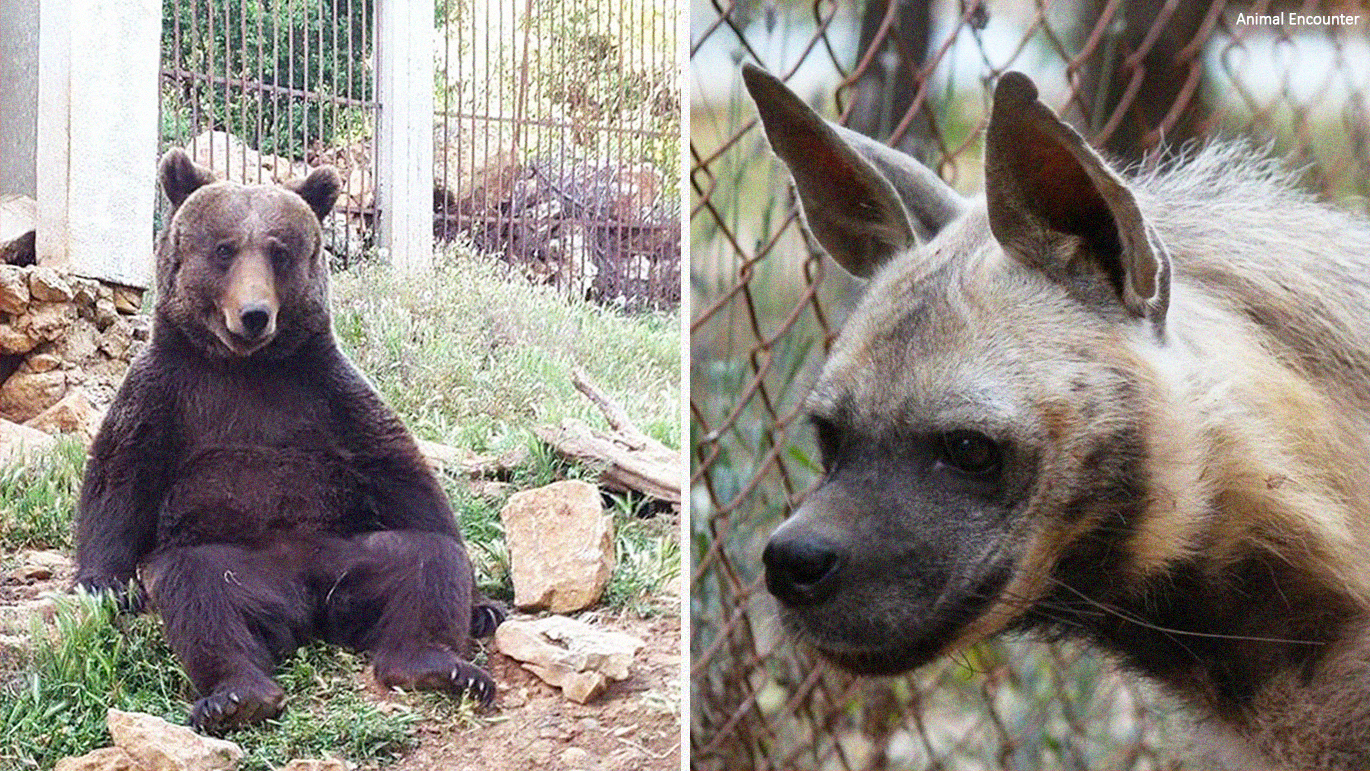The Animal Encounter started with Teddy, a Syrian brown bear abandoned by a bankrupt circus, in the Abi Said family’s backyard.
In 1993, Dr. Mounir and Diana Abi Said established the first, and thus far only, animal rehabilitation and education center in Lebanon to save local wildlife through captive breeding, spread awareness about the importance of Lebanese fauna, and fight false and harmful stereotypes surrounding them.
“The animals have suffered due to the negative stereotypes about them in society,” said Dr. Mounir. “We need to teach our children that not all wild animals are dangerous, hyenas will not eat you, and bats don’t make you go blind.”
The Animal Encounter (AE) Educational Center for Wildlife Conservation also cares for and rehabilitates injured or endangered animals until they are deemed healthy enough and safe to be released back into the wilderness.
Saving Lebanon’s wildlife since 1993
When the AE project first started in the Abi Saids’ backyard, most of the animals were bought from the black market, where they were found, to be liberated and admitted into the center. With time, however, the co-founders changed their approach when they realized that buying these animals only encourages the market.
The center shifted towards taking in stranded and wounded animals, like Teddy was in 1993. By 1997, the Animal Encounter was caring for a bear, jackals, porcupines, hyenas, vultures, foxes, badgers, squirrels, a baboon, deer, storks, peacocks, chickens, and pheasants, among other animals.
Seeing the impact the Abi Saids had on Lebanese wildlife, the Municipality of Aley generously donated a piece of land in Aley’s Ras El Jabal –where AE was relocated, expanded its operation, and is currently situated.
Dr. Mounir and Diana Abi Said, who respectively hold a PhD in Biodiversity Management from the University of Kentbury and a Master’s degree in Agronomy from the American University of Beirut, founded the organization as an animal sanctuary and rehabilitation center.
The co-founders believe that it is important not to identify Animal Encounter as a zoo, since zoos focus more on exhibiting animals rather than protecting them.
The AE logo is the striped hyena, the national animal of Lebanon. In 1994, the center received two orphaned hyaenas, dubbed Dingo and Dinga. The furry couple were raised by the founders and gave birth to around 20 cubs before passing away from old age. Most of the cubs were reintroduced and released into the wild after maturity.
Some such as Stripey, who was born in 2006, remained in the center because she matured at the time of the July War –which forced her prolonged interaction with humans. Being accustomed to living between humans reduces her chances in the wild, which is why she could not be released.
In late 2019, the founders took in Lucky, a baby cub who was less than a week old and whose parents and siblings were killed by hunters. The cub needed to be raised by hand as he was too young to survive without intimate nurture and quickly became accustomed to humans.
Lucky is currently being cared for in the co-founders’ backyard, before being transported to the main center upon maturity. The founders plan to have him breed with Stripey, then release their cubs into nature to augment the hyena population in Lebanon.
The importance of wildlife education
After its establishment, Dr. Mounir and Diana recognized the center’s potential to educate locals on Lebanese wildlife. On average, approximately 20,000 students from all over Lebanon visit the Animal Encounter center every year.
When visitors come to the center, they are given guided tours and taught about Lebanon’s biodiversity, the animals present, their role in nature, and how to conserve them.
Over the years, bigger groups including schools and summer camps started bringing their students in to learn about the ecology in an outdoor environment. The activities presented include lectures and hands-on activities.
This has significantly served Lebanese wildlife, by changing how animals inhabiting and native to Lebanon are viewed among locals and altering the predominant negative stereotypes surrounding them.
The lack of awareness can be devastatingly threatening to the wildlife. For instance, the AE co-founders discovered one of the biggest bat colonies in the Middle East in Lebanon’s Akkar region. The fruit bat colony, which held around 7,000 bats, was massacred by humans and the cave was destroyed to ensure that no bat can return to it.
The slaughtering of the bat colony affirmed the need for raising awareness of bats among other wildlife in Lebanon, leading the Animal Encounter in 2012 to become the first organization in the Middle East to host the International Bat Night event.
Through lectures and games, the annual event highlights the importance of bats and counters negative beliefs surrounding them.
“Lebanon was the only country in the Middle East that worked with Eurobats back in 2012, which happened to be the year of the bat as dictated by the UN,” said Diana Abi Said.
Dr. Mounir has also conducted research on bats for 12 years, assessing the population of bats in Lebanon, their ecology and the diseases they carry –including the coronavirus and MERS. Some of his research can be found in the Netflix documentary Pandemic.
Dwindling funds in the face of crises
At first, the Animal Encounter was entirely self-funded. The center currently relies on the co-founders’ personal funds and visitors’ contributions to keep the animals as comfortable as possible and to preserve the center’s infrastructure.
Given the current economic crisis in the country and ongoing COVID-19 restrictions, funding for the sanctuary has dwindled and maintaining its operations has become increasingly difficult.
AE’s current objective is to maintain and then expand its operations and inspire others to follow in their footsteps.You can support and stay up-to-date with the Animal Encounter’s news and activities, through following their Facebook and Instagram pages.
Edited by Sara Jaroush and Laudy Issa


